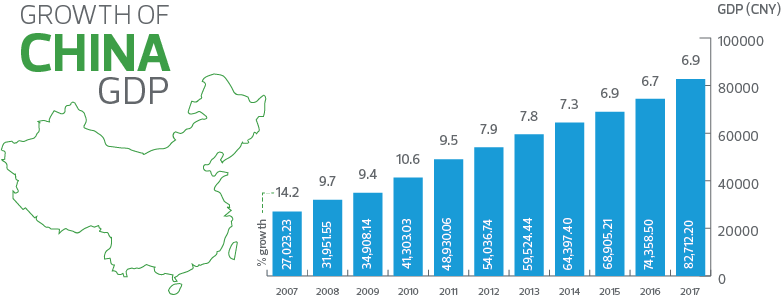China is rapidly becoming the new champion of economic cooperation, trade and globalisation. As others retreat from the forefront, Chinese businesses are looking to expand and grow into all corners of the world.
China and globalisation are no strangers. The process has been happening for a long time, and it is essential that any business looking to break into China combines a global strategy combined with a market specific approach.
As the global economy shifts its focus towards China, new opportunities for businesses to enter the Chinese market are emerging. In other words, the impact of globalisation on China’s economic growth is already being felt. China is rapidly becoming the new champion of economic cooperation, trade and globalisation. As others retreat from the forefront, Chinese businesses are looking to expand and grow into all corners of the world.
A Chinese globalisation case study worth following is the Belt and Road Initiative (BRI), devised by China’s premier Xi Jinping, which focuses on connecting the vast array of countries that sit within the region. It’s one of the reasons for the growth of globalisation in China, and this Chinese led trade network enables large, medium and small enterprises to realise their potential and trade more simply and expansively around Asia.
While businesses are eager to take to the world stage and reap the benefits of globalisation in China, they remain cautious of outsiders. Ensuring you are culturally sensitive will offset some of this reticence and businesses of any size must appreciate that Chinese business culture does not follow western norms.
Businesses that wish to be successful in China need to not only consider the business culture, but also how regulations and political policies are shaped by that culture.
The shift towards protectionist attitudes that we have seen in some key markets are examples of western politics negatively affecting the global ambitions of Chinese businesses. It is actually in spite of this that the outlook is still positive and demonstrates the resilience of Chinese businesses. (Another good globalisation case study for China is Huawei, which shows this resilience and continues to expand its global market share).
Businesses that wish to be successful in China need to not only consider the business culture, but also how regulations and political policies are shaped by that culture. Building trust is key, as is working with local partners who understand the local landscape. It is imperative in Chinese business to show you are trying to work towards a mutually beneficial outcome.

Many influencers are starting to question whether if in China globalisation is causing business culture to separate from tradition – and if so, the impact this would have on established business practice. When considering the Chinese way of thinking, illustrated by the value of “people-oriented” methods, some may argue that business is detaching itself from people. However, the current issue businesses must confront, in the face of deglobalisation, is how to maintain a balance when dealing with global development on one hand, and a global populous that is becoming increasingly sceptical of international business. The prosperity of a country and the businesses within it can, in itself, be seen as people-oriented, but only if Chinese society believes the spoils of globalisation are shared.
Protectionism may bring short term benefits but the global economy would suffer if the flow of capital and business were less dynamic. One should not react by shutting out outsiders. As the ideas of reciprocity and benevolence indicate, cooperation is a better way to succeed. As businesses large and small continue to look abroad for growth, it has become more important than ever to realise the power of diversity.
So, with all these considerations in mind, how has globalisation affected China? The answer might be that while globalisation has boosted expansion and interaction within political, economic and cultural terms, it has also brought friction and conflict – which foreign businesses can help to assuage through understanding working practices in China.
Crucially, businesses must keep in mind that China is seeing a divergence between its generations. The young are more aware of the outside world and often more tolerant of different people and values. On the other hand, the older generations in China do not have much experience of the rest of the world, but they appreciate people who try to become more informed and understand Chinese culture. At the same time, as the younger Chinese look outwards, so does the Government, and it is this shift in perceptions that presents the greatest opportunity for businesses to work in partnership with the Chinese. To become a global business player, one needs to be a global thinker first.
With this in mind, the Chinese way of conducting business is likely to become even more relevant, particularly as the previous instigators of global cooperation opt to retreat from the forefront of an increasingly connected world. Thus, while it is still not clear what direction China and globalisation are taking in respect of each other, and it remains unclear what shape plans such as the BRI will take, we are in a position where understanding the Chinese way of doing business is crucial not only for being successful in China, but also the wider world.
Dr Hong Lu
Deputy Director, Confucius Institute for Business London
